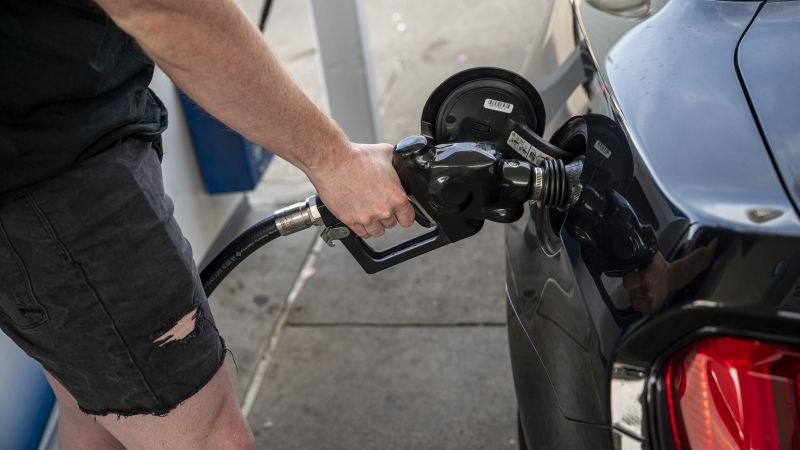Gas prices in the United States have slid from their all-time peak in fall 2022, but there are drivers in at least one state who still pull up to the pump and cringe.
The current average gas price in the US is $3.10. In California, it’s $4.49, according to AAA.
That’s not an anomaly — Californians consistently pay more for gas than the rest of the country. A confluence of factors join together to increase the price of gas in The Golden State, including environmental restrictions, higher taxes and a shrinking number of regional refineries.
One of the more notable factors is that the state now actually burns the cleanest gas in the world, according to Severin Borenstein, faculty director of the energy institute at the University of California Berkeley’s Haas School of Business.
That’s because California has its own specific blend of fuel that emits fewer greenhouse gases when burned, Borenstein said.
California has historically led the way in lowering emissions. Due to a carve-out in the 1970 US Clean Air Act, California is the only US state that can set stricter emissions standards than the federal government.
It might seem odd that one state was given the power to set its own rules while the rest of the US must follow standards set by the federal government or opt into California’s standards. But California has battled air quality issues for decades.
Los Angeles experienced its first episode of “smog” in the summer of 1943, according to the California Air Resources Board. Visibility reportedly only extended three blocks, and Los Angeles residents experienced burning eyes, lungs and nausea.
The California government went on the hunt to stop these “gas attacks,” as they were once called, regulating power plants and oil refineries in the state.
In 1966, California was the first state to pass tailpipe emissions standards, and in 1967, Gov. Ronald Reagan approved the Mulford-Carrell Air Resources Act to address pollution.
“We must constantly search for ways to improve our environment consistent with our technology and growth,” Reagan said at the bill’s signing.
California’s special gasoline blend arose out the state’s efforts to curb emissions. It adds about 10 cents of additional cost per gallon of gas, said Borenstein. The trade-off is cleaner air for California. Proponents “will point out the reason you can see the mountains from Los Angeles now is the formula that we started using almost 30 years ago,” he said.
“No one else in the world uses it,” he added.
But while California’s pollution problem has improved, many Californian cities still rank among the nation’s most polluted, according to a recent study by the American Lung Association.
Hawaii is the only state currently with higher gas prices than California — but Hawaii’s geographical isolation plays a large role in that state’s higher prices across the board. California doesn’t have that same issue.
Yet, in the fall of 2022, California gas prices shot up to a record high of nearly $6.50 per gallon after multiple refineries suffered outages.
The shrinking number of oil refineries in California is another reason there’s a growing gap between California and the rest of the country’s gas prices.
Today, there are only 11 major refineries that can produce gasoline that meets California’s specific environmental standards. Those 11 refineries produce 90% of California’s gas and diesel fuel, according to California’s energy department.
“The problem is that California is kind of segregated from the rest of the nation in its requirements for gasoline,” said Patrick De Haan, head of petroleum analysis at GasBuddy. “A declining amount of refineries can produce to that specification.” And “if one of your refineries goes down, it’s a much bigger problem now compared to decades ago,” he said.
The issue may be temporary though: in 2022, California officially passed a law that will ban the sale of all new gas-powered vehicles by 2035.
But for the time being, many Californians still need to fuel their cars with gas.
Adding to the bill at the pump, California motorists also pay the highest taxes in the country, according to data compiled by the US Energy Information Administration.
Drivers in California pay a per gallon excise tax and sales tax.
The dual tax on gasoline sets California apart: Most states do not have a sales tax on gasoline.
Compare the current average gas price in California at $4.49, to lower-taxed southern states like Texas at $2.75, Oklahoma at $2.66 and Louisiana at $2.78.
But Borenstein has another theory for why the price of gas is so much higher in California.
“California has way fewer off-brand stations like the Costcos and Safeways, but also the Rotten Robbie’s,” Borenstein said. “The sort of Joe’s gas-type stations.”
The reason, in Borenstein’s estimation, is that Californians are more devoted to brand-name oil, like Chevron, Shell and Mobil.
“I think part of the problem is that Californians do not shop as aggressively for gasoline,” he said.
Read the full article here
